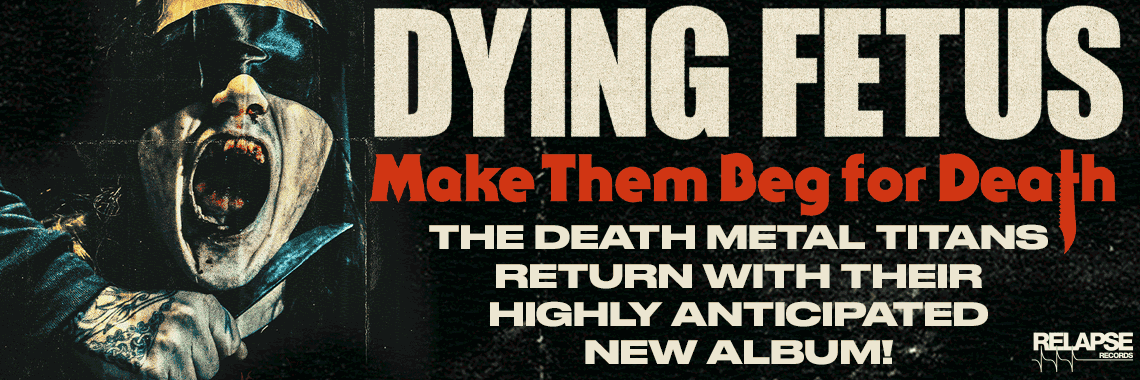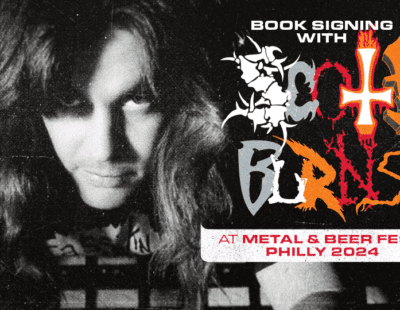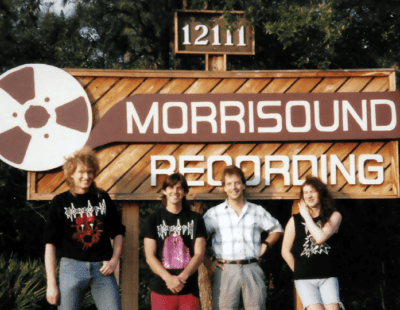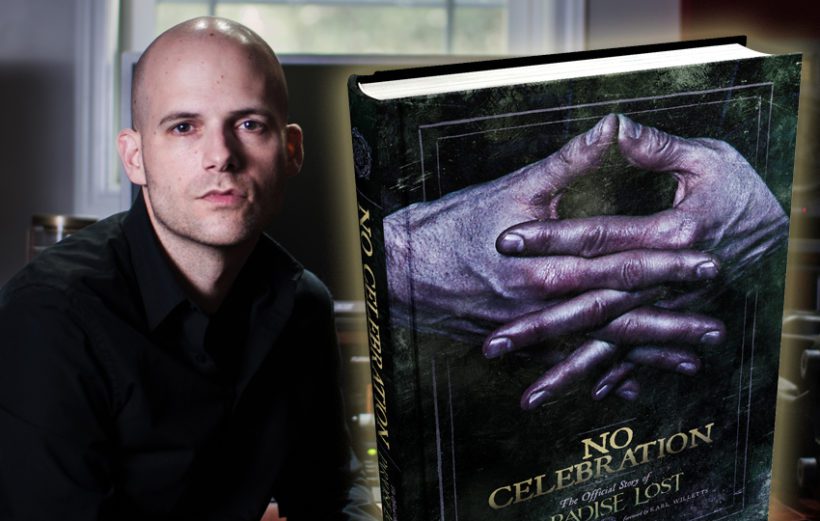
Author David E. Gehlke now has the distinction of writing two extremely cool, extremely metal, and extremely niche (more on that later) books: The author of the must-read Damn the Machine: The Story of Noise Records has returned with No Celebration, an authorized history of doom legends Paradise Lost.
Published right here through Decibel‘s own publishing imprint Decibel Books, No Celebration chronicles the ups (hello, Icon, Shades of God, etc.) and downs (what’s up, Believe in Nothing?) of this most majestic and royal of all death/doom bands. We caught up with Gehlke to get the lowdown on where the idea came from, what it was like putting the book together behind the scenes and more.
Pre-order No Celebration here.
Where did the idea to do a book about Paradise Lost come from?
The idea started in 2017 around the time Medusa was released. Paradise Lost was approaching 30 years as a band and Medusa had started to generate all sorts of really nice reviews and positive press. So, it seemed like all of the proverbial stars had aligned for a book about a band with a rich, oftentimes complex, history who were now releasing an album that many were hailing as a “return to form.” I first shared the idea with [Decibel Editor-in-Chief] Albert Mudrian, who said Decibel would release it. He put me in touch with Northern Music Company, who manages Paradise Lost, who then broached the idea to the band. It took a few months to hammer out particulars, such as what we were to cover, how we were to handle interviews and the timeline, but once we nailed that down, we were off and running by August 2018.
What challenges did you face writing this?
Few, if any, frankly. Since the current incarnation of Paradise Lost, as well as former members, agreed to take part, that took away a lot of the aggravating legwork that goes into writing a book. Sure, there were a few people we wanted to talk to but couldn’t pin down—namely the A&R guy who worked on Believe in Nothing—but everyone else who was deemed critical to the story agreed to be interviewed. Maybe the only challenge was getting used to how the guys talk. Nick talks very fast and can be extremely sarcastic, while Steve is a man of few words, but when he did want to make a point about something it almost always ended up in the book. Greg almost has an aversion to admitting how significant some of his songs are, so I had to occasionally pull it out of him. Aaron, on the other hand, is Paradise Lost’s biggest cheerleader and was never at a loss for words or stories. Perhaps that and figuring out a title were the only challenges. I initially suggested Until the Grave, but Albert didn’t like it. “No Celebration” from Symbol of Life popped up one day while I was at work and that’s when the light bulb went off. Thankfully, Albert and the rest of the band were as gung-ho about it as I was.
This is a pretty niche subject; do you feel the book has potential for broader appeal than it initially seems?
Sure, although it will probably not get beyond the metal scene. Paradise Lost was certainly not a metal band from, say, 1997 to 2001, but they didn’t quite inherit a new audience. So, they were a dark rock band with electronic elements still very much entrenched in the metal scene. The appeal with No Celebration is a band that could have very easily rested on their laurels and milked their career but instead dared to go where few metal bands would go. And in the process, they had their dalliance in major-label-land, where it didn’t go well, and eventually worked their way back into the good graces of the metal scene.
It’s an authorized biography, which I imagine means the process of writing it was a bit different than what we’re used to as journalists. How involved was the band in things? Did they have final say over the copy?
This is your classic “authorized biography.” The band was involved in every step of the way and had final say over the copy. Even their manager, Andy Farrow, reviewed some of the more in-depth contractual details that made it into the book. However, they never hovered over my shoulder when I was writing. I decided upon the topics for each chapter and was given free rein to write the book how I pleased. There were a few things we agreed upon to tread a bit more carefully with than others, but, for the most part, the band was pretty unfiltered throughout. This was especially helpful with the Host chapter, when some of the guys were going through some pretty significant personal problems that ultimately affected the course of the album. Same goes for the Believe in Nothing chapter—largely the same problems existed and it led to what is widely considered to be their worst album. We didn’t sugarcoat much, if anything.
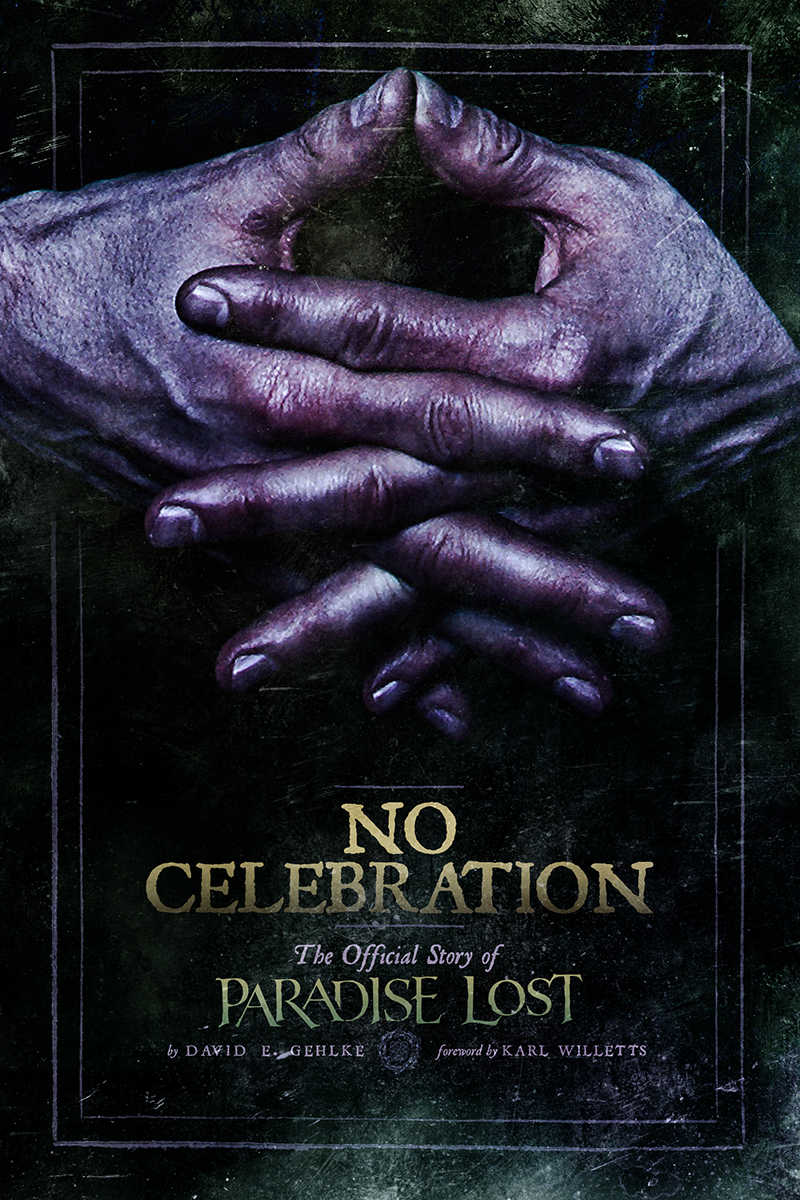
Why do Paradise Lost deserve a book?
They are the undisputed innovators of gothic metal. There is little arguing they were the first out of the gate with that sound; Anathema and My Dying Bride came shortly thereafter, but the groundwork was already laid by Paradise Lost. A good chunk of the symphonic metal subgenre took cues from Paradise Lost, namely the use of operatic, female vocals. Sure, Celtic Frost did it on Into the Pandemonium, but, certainly, no one considers that to be a death metal album. Paradise Lost gave the metal scene the added flexibility to bring in those elements and place them within the frame of death metal.
Paradise Lost also took the brunt of the “directional change” backlash when they released One Second. Other bands were also going away from their core sound, but Paradise Lost received the most flak, probably since they were one of the most successful European bands to significantly change their sound. They are utterly fearless and simply do not care about what the perception is of them, especially Greg. He literally does not give a hoot. This innovation and fearlessness are two qualities most metal bands do not have, which is why they were deserving of a book. And let’s not forget about some of the albums that have gotten lost in the shuffle like Shades of God or 2005’s self-titled. They were worthy of further inspection and some due credit, especially the self-titled, which is criminally, criminally overlooked.
What’s your favorite Paradise Lost album and why? What about least favorite?
Draconian Times is my favorite Paradise Lost album. It is unrivaled in class, elegance, songwriting and sequence. Greg always refers to it as the “extension of Icon” and he’s not wrong, but Draconian Times is tighter and better orchestrated. It has its heavy moments (“Once Solemn”) as well as its dark, miserable ones (“Forever Failure,” “Elusive Cure”), and also some near-uplifting, almost arena-ready cuts (“Hallowed Land,” “Shadowkings”). It’s without flaw.
Believe in Nothing is my least favorite and I’m certainly not in the minority. The band was a mess at this time. Nick and Greg didn’t know which direction to go, and EMI wanted them to wiggle into the rock radio market, so they came up with this confusing batch of songs that lack coherence and the songwriting hooks they were known for. It was so bad that they were asked to go back into the studio to write more songs after originally submitting it to EMI, but that didn’t change much. “Mouth” is a really strong cut, as is “World Pretending.” Beyond that, it’s hard to defend Believe in Nothing.
What’s next for you?
That’s a good question. Very likely there will be some foreign language editions of the book, so that’s on the immediate agenda. Paradise Lost has a strong Eastern European fanbase — it makes sense to create one for those particular markets. Beyond that, I will resume writing for Dead Rhetoric, as well as Blabbermouth, where I’m fortunate to be a regular news contributor to the site. Surely once a few months pass the urge will come back to do a third book, too.

